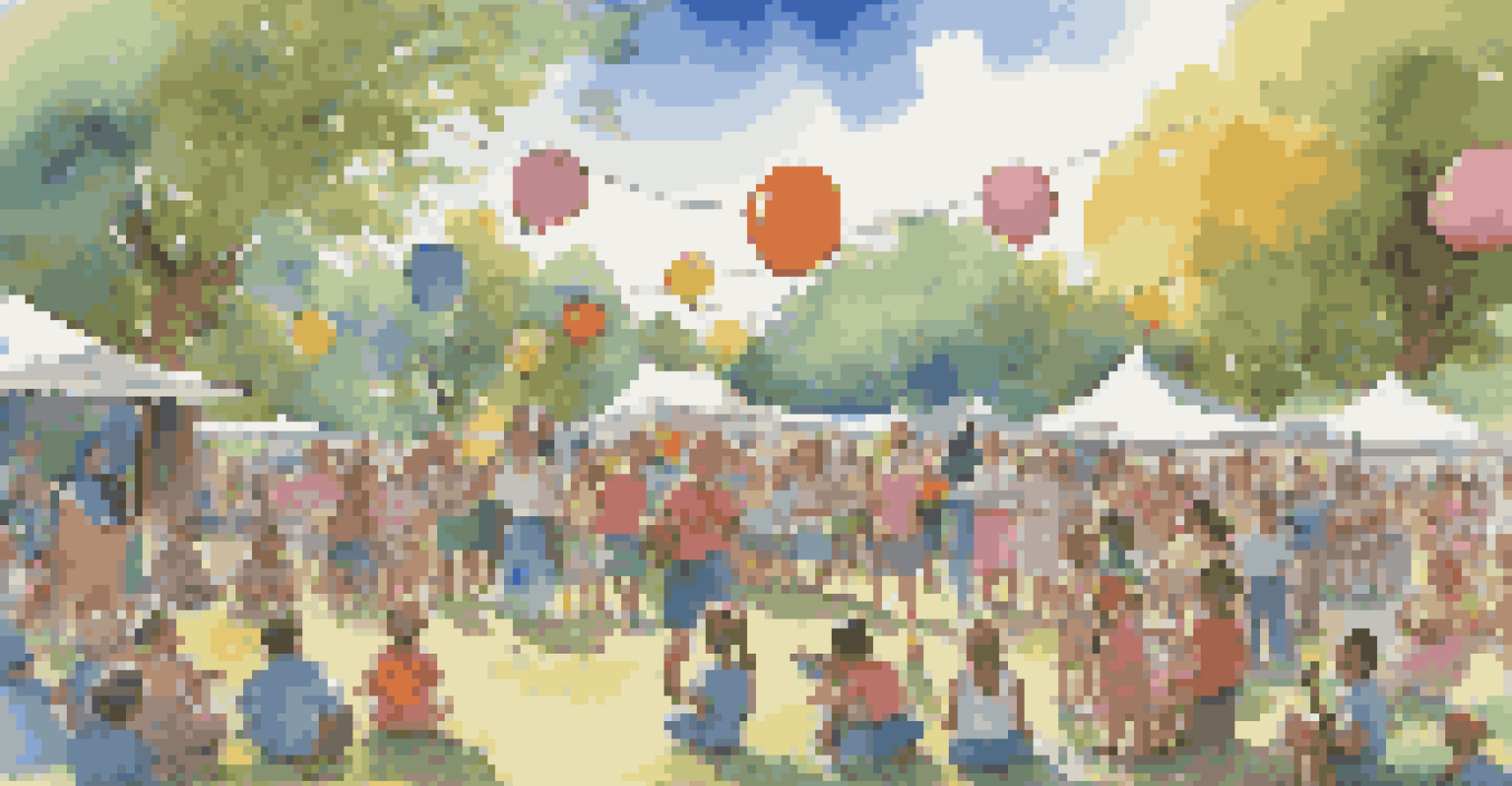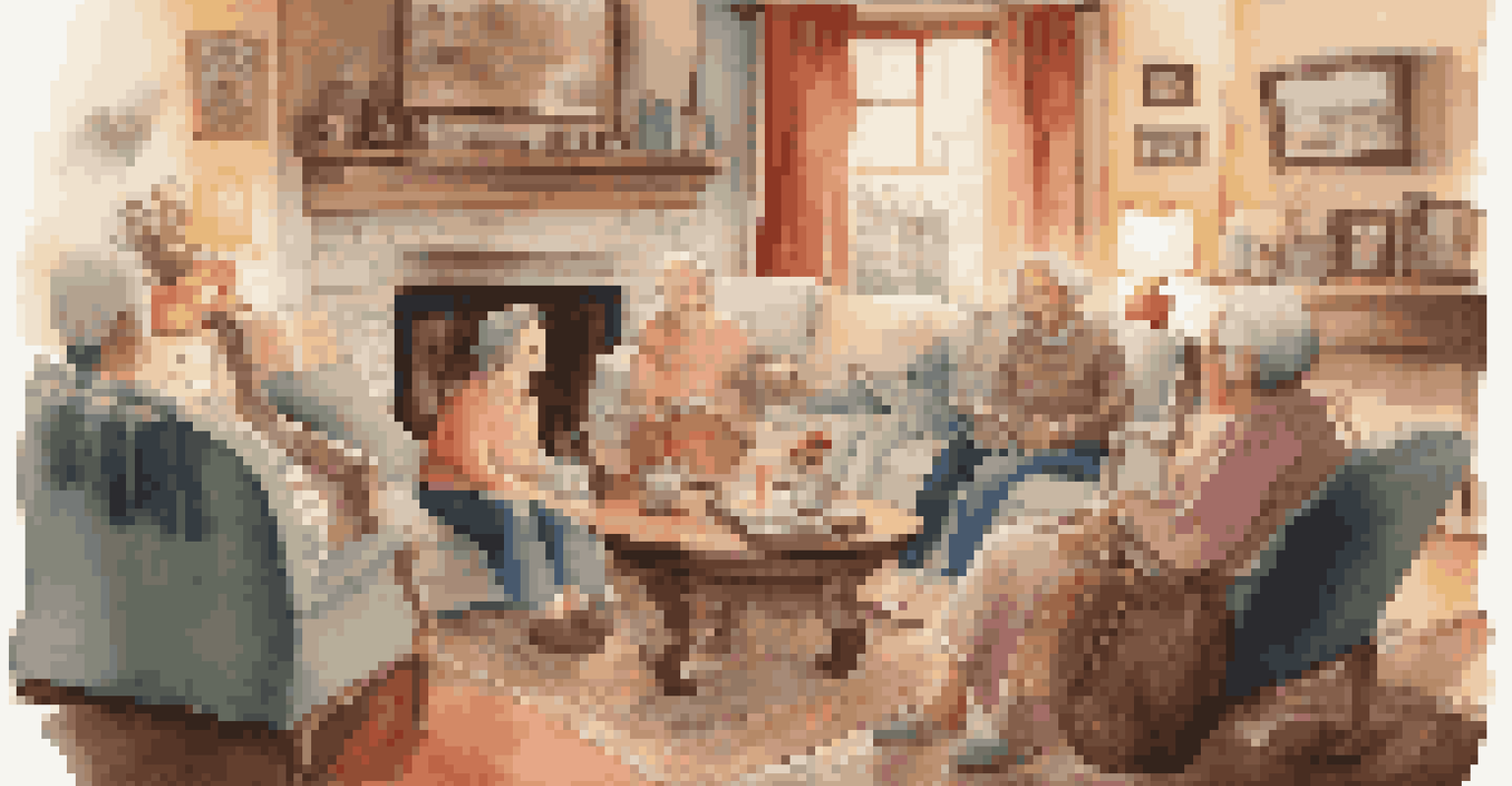Music and Aging: Fostering Intergenerational Connections

The Universal Language of Music in All Ages
Music has a unique ability to transcend age barriers, creating a shared experience for people from different generations. Whether it’s the soothing melodies of classical music or the upbeat vibes of rock, music can evoke powerful emotions and memories. This universality makes it a perfect medium for fostering connections between the young and the elderly.
Music can change the world because it can change people.
For instance, consider a grandparent sharing their favorite tunes with their grandchildren. This simple act not only creates a bonding moment but also opens the door for conversations about history and personal experiences. Such interactions can enrich the lives of both generations, making them feel more connected and understood.
Moreover, when young people introduce older adults to contemporary music, it can lead to exciting discussions about cultural shifts and societal changes. This exchange fosters mutual respect and understanding, highlighting the importance of music in bridging generational gaps.
The Role of Music in Cognitive Health for Seniors
Research shows that engaging with music can significantly benefit cognitive health in older adults. Activities like singing, playing instruments, or even just listening to music can stimulate brain function and enhance memory. This is particularly important as we age and may face cognitive decline.

For example, many memory care facilities incorporate music therapy into their programs, helping residents reconnect with their past and improve their mood. Such therapeutic activities not only provide emotional support but also foster a sense of community among participants. This is a testament to the power of music in enhancing quality of life.
Music Bridges Generational Gaps
Music creates shared experiences that foster connections and understanding between different age groups.
Furthermore, studies have indicated that music can help reduce feelings of loneliness and depression in seniors. When they engage in musical activities with younger generations, it promotes a sense of belonging and purpose, proving that music is a vital tool for emotional well-being.
Music as a Catalyst for Intergenerational Activities
Music can be the foundation of various intergenerational activities that bring people together. Community centers and schools often host events like sing-alongs, concerts, or music workshops where individuals from different age groups can collaborate. These events not only celebrate music but also encourage dialogue and friendship.
Without music, life would be a mistake.
Imagine a community event where children learn to play traditional folk songs from seniors. This not only preserves cultural heritage but also strengthens bonds as they work together to create something beautiful. Such activities promote teamwork and mutual appreciation between generations.
Moreover, these musical interactions can lead to the formation of mentorship relationships. Younger individuals may learn valuable life lessons from their elders, while seniors may gain a fresh perspective on contemporary issues, illustrating the reciprocal nature of these connections.
The Impact of Music on Emotional Well-Being
Music has an incredible impact on our emotional well-being, which is especially crucial as we age. Listening to or performing music can release endorphins, helping to alleviate stress and anxiety. This emotional uplift can be particularly beneficial for older adults who may face isolation or health challenges.
For example, participating in group music sessions can create a joyful atmosphere, fostering laughter and happiness among participants. This shared joy helps to create lasting memories and strengthens interpersonal relationships. It’s a beautiful reminder that music can be a source of comfort and joy in our lives.
Enhancing Seniors' Cognitive Health
Engaging with music can significantly improve cognitive health and emotional well-being in older adults.
Moreover, emotional connections through music can lead to improved overall health. When older adults feel happier and more engaged, they are more likely to lead active lifestyles, which can enhance their physical health as well. This illustrates the profound connection between music, emotions, and well-being.
Exploring Diverse Musical Genres Together
Exploring different musical genres can be an exciting adventure for both young and old. From jazz and blues to hip-hop and pop, each genre has its own story and cultural significance. When generations come together to explore these genres, it fosters an environment of curiosity and learning.
For instance, a teenager might introduce a grandparent to the rhythms of modern hip-hop, while the grandparent shares the soulful sounds of Motown. This exchange not only broadens musical horizons but also encourages discussions about the artists, lyrics, and the cultural contexts behind the music. Such dialogues can enrich understanding and appreciation across generations.
Furthermore, these musical explorations can inspire creative projects, such as collaborative playlists, dance sessions, or even songwriting. This creative expression allows both generations to contribute their unique perspectives, making the experience even more fulfilling and enjoyable.
The Power of Music in Storytelling and Memory Sharing
Music often serves as a powerful storytelling tool, allowing individuals to share their life experiences in a meaningful way. For seniors, playing a favorite song can evoke vivid memories, leading to rich storytelling moments with younger listeners. These shared stories help preserve family histories and traditions.
Imagine a family gathering where a grandmother plays the songs that marked significant moments in her life. As she recounts her stories, younger family members gain insights into their heritage and family dynamics. This sharing of stories deepens connections and fosters appreciation for one another’s experiences.
Intergenerational Music Programs Thrive
Establishing inclusive music programs strengthens community bonds and promotes social change across generations.
Additionally, creating a family playlist that includes songs from different generations can serve as a time capsule. It not only captures personal narratives but also highlights the evolution of music styles and cultural changes. This collaborative effort can become a cherished family tradition, reinforcing the importance of music in storytelling.
Creating Lasting Intergenerational Music Programs
Establishing intergenerational music programs can have a profound impact on communities, fostering connections and understanding. These programs can take many forms, such as community choirs, music clubs, or educational workshops that encourage collaboration between age groups. The key is to create inclusive environments where everyone feels welcome.
For example, a local library might host a monthly music night where people of all ages can come together to share their favorite songs and learn new ones. This not only promotes musical appreciation but also cultivates friendships and a sense of belonging within the community. Such initiatives can empower individuals to express themselves creatively.

Moreover, these programs can serve as a platform for addressing social issues, such as ageism. By encouraging interactions between generations, we can challenge stereotypes and promote understanding, ultimately creating a more cohesive society. Music, therefore, becomes a vehicle for social change and connection.